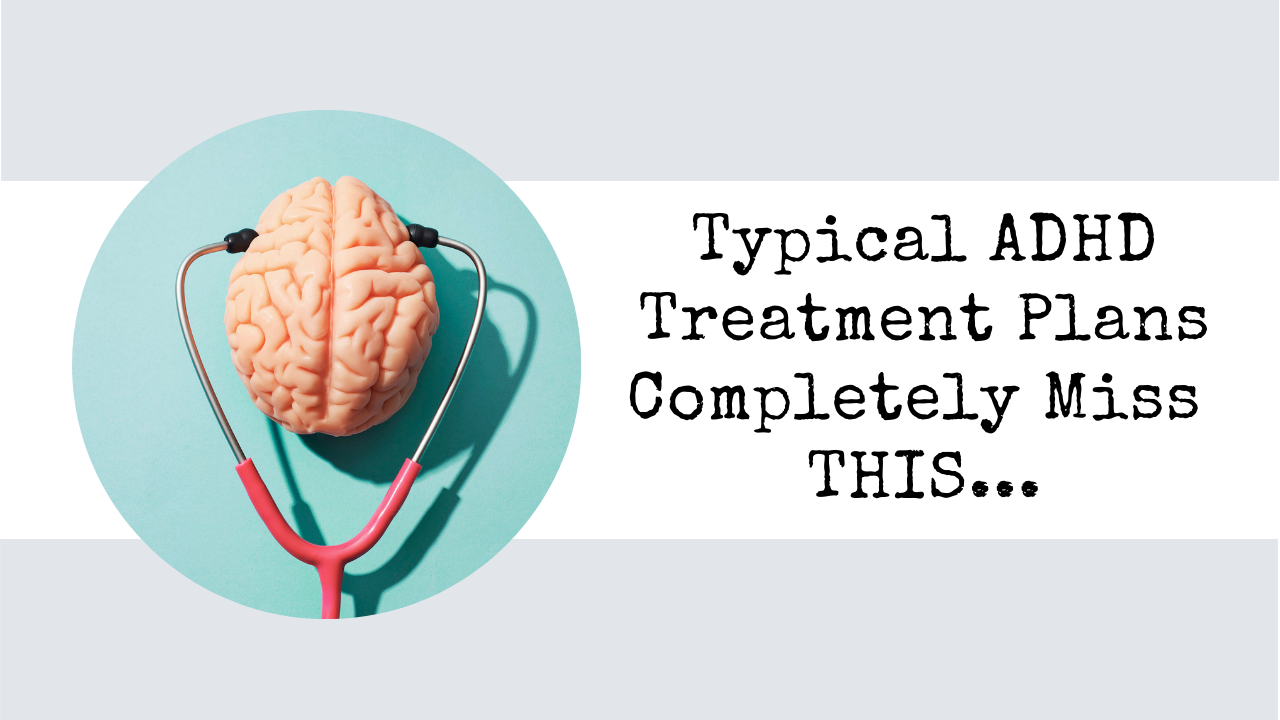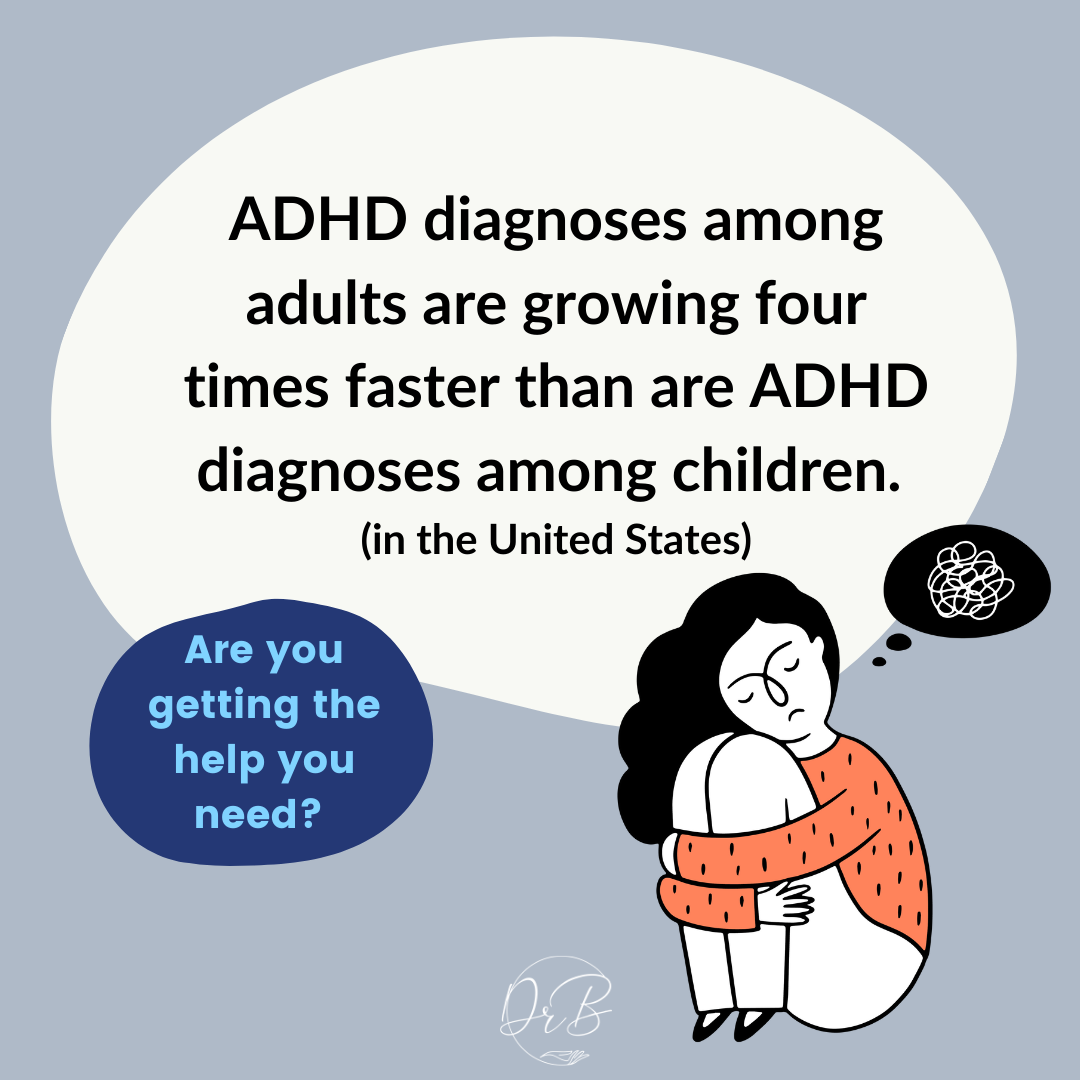
What's Missing In Your ADHD Treatment Plan?
May 21, 2022First, the Facts about Adult ADHD...
Did you know that ADHD diagnoses among U.S. adults are growing four times faster than are ADHD diagnoses among children (26.4% increase among children compared to 123.3% among adults.) (1)
Also, according to some sources fewer than 20% of adults with ADHD are currently diagnosed and/or treated. (2,3,4)
What’s worse, in spite of getting a diagnosis, adults are not being provided the critical information they need about developing their Executive Function skills as part of an overall treatment plan.

Setting the Record Straight About Adult ADHD
So let me set the record straight: if your daily struggles do not stem directly from the three core symptoms of ADHD—inattentiveness, hyperactivity, and/or impulsivity—your struggles are the result of some type of deficit in the development of your Executive Function skills.
That means things like time management, planning and scheduling, organizing your things, monitoring your emotional regulation, etc., are still falling through the cracks.
That’s because all of the above, and much more, are foundational Executive Function skills.
With medication, your brain may function better. You may find you can concentrate better, feel less impulsive and be able to sit through a meeting with more ease.
That’s great, but…
What about everything else? Like keeping track of clients’ files, following up on sales leads, budgeting your time effectively. No medicine in the world will do that for you.
The ideal thing would be to have grown up learning these skills. Sometimes we do have those opportunities, and often it comes in early childhood. For example, playing games like Freeze Tag or Red-Light-Green-Light build the EF skill of Inhibiting. Or, if you were a Scout and did a lot of camping, you probably learned some foresight skills that helped you with the EF skills of Planning and Scheduling.
However, most of the time we don’t learn specific EF skills. Very few schools incorporate them into their curriculum. And parents can only do the best they can with what they’ve got, and if they’ve never learned these skills themselves, how can they possibly pass them on?
And as I said earlier, even the medical profession is missing the opportunity to help patients. At least many of them. I happen to know a few good ones out there, but they are rare. If you have one who has provided resources for you to develop your EF skills, consider yourself very lucky.
My hope is that eventually more and more healthcare providers will see the benefits of specialized Executive Function training for adults. And if they would start early, when kids are diagnosed, that would be even better!
Until then, it is incumbent on the individual to seek out ways to develop all the EF skills needed as an adult. I’ve never found books particularly helpful, because it was just head knowledge. There were a lot of statistics and explanations of what the problems were, but little in the way of practical solutions that I could integrate into my own life.
Getting the Right Treatment for Adult ADHD
I have found only one thing to be truly effective: a specialized training and coaching program, where you not only get the “what,” but you get the “how.”
I liken it to athletic training. If you read a book about playing tennis, you’ll end up with a basic knowledge of the game. But, it won’t make you a good tennis player. To be good, you have to put your shoes on, actually go to the courts, practice drills, and play the game. But what if you want to be more than good? Great even? You need a qualified coach to teach you how to play better. We all know a second set of eyes sees things we don’t. For tennis, that might mean you’re not aware of when you’re dropping your elbow or getting too close to the ball. Whatever it is, you’ll keep doing the wrong thing until your coach points it out and helps you to adjust with a new technique.
It’s the same process with Executive Function training. You don’t know what you don’t know. If you want to really leap ahead to the next level of performance, you need to work with a coach who has the knowledge, training and experience to provide the full package.
And that’s the message that I would love for each person getting a new ADHD diagnosis to hear: You need to develop your Executive Function skills, and the fastest, most effective way is to join a reputable training program with an expert coach.
A woman can dream, right?
Well, if you’re dreaming of EF skills (and who doesn’t wish they were more organized and capable in their daily life?), perhaps now is the time to go beyond wishing. If you want to develop better executive functioning in a proven training program that will elevate your skills quicker than any other, I encourage you to check out the ADDventures In Achievement Foundational Skills Program.
It’s seven months of incredibly effective, in-depth training and coaching that will empower you to turn your untapped gifts into your most valuable assets. You’ll finally have the opportunity to realize your potential because your underdeveloped EF skills won’t be undermining your best efforts anymore. You’ll be the one who can manage your time and responsibilities (at work and at home) with greater ease and a lot less chaos.
Your healthcare professional may have missed telling you about EF skills as part of your ADHD diagnosis and treatment plan, but now you know.
And now you can do something about developing those skills, so you can function more productively at work and create more balance in your personal life. The choice is yours. What do you want for yourself and for your future?
A Simple Executive Function Skills Assessment Tool For You
One last thought. If you’re at the very beginning of your journey, it’s important to get the information that you need to advocate for yourself. I offer a free self-test, “13 Signs Executive Functioning is Holding You Back.” Within this tool, I offer helpful information and offer the questions you need to ask your mental health professional to get the help you need.
You can request your copy here: https://www.drbarbaracohen.com/Executive-Function
1Chung W, Jiang S, Paksarian D, et al. Trends in the Prevalence and Incidence of Attention-Deficit/Hyperactivity Disorder Among Adults and Children of Different Racial and Ethnic Groups. JAMA Netw Open. 2019;2(11):e1914344.
2Fayyad J, De Graaf R, Kessler R, et al. Cross-national prevalence and correlates of adult attention-deficit/hyperactivity disorder. Br J Psychiatry. 2007;190(5):402–409. [PubMed] [Google Scholar]
3Retz W, Retz-Junginger P, Thome J, et al. Pharmacological treatment of adult ADHD in Europe. World J Biol Psychiatry. 2011;12(suppl 1):89–94. [PubMed] [Google Scholar]
4Newcorn JH, Weiss M, Stein MA. The complexity of ADHD: diagnosis and treatment of the adult patient with comorbidities. CNS Spectr. 2007;12(suppl 12):1–14. quiz 15–16. [PubMed] [Google Scholar]

